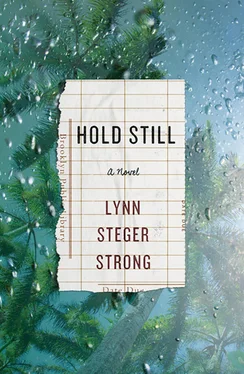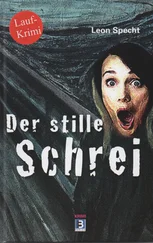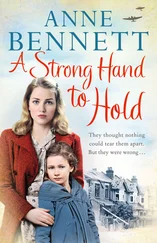Her brother cups his coffee in one long-fingered hand and watches Ellie. She dips her finger, one more time, into his syrup, and keeps her eyes turned toward his plate.
“I love you, you know?” she says.
Her brother fingers the rim of the coffee with his free hand and looks down too into his empty plate.
She passes him the rest of her omelet and sips her coffee. “I’m sorry, Benny,” she says.
“I know, El,” her brother says. “Me too.”
When the phone rings, it’s the middle of the night, and every time, before she remembers, Maya thinks: Ellie . But then right after that she holds her breath, picks up the phone, and waits.
Maya thinks later that she knew it was her even before she started speaking, the way she paused, the way she breathed in once, long, then spoke in one big rush.
Annie gives no preamble. “I don’t sleep, right?” she says.
This is the first that Maya’s heard from her since the day before it happened. She almost doesn’t know her voice.
“I mean, I guess I must, because I’m still, vaguely, somehow functional. Restaurant to run. Responsibilities. I’m grateful for it, actually. Because then, at home, there’s Jack. And Jack. And Jack. And I can’t look away from it. I’m still such a mess and all to myself, it’s no good. But I don’t ever remember sleeping. I don’t remember waking up. I always have noise going, in the bedroom, in the living room. I keep the radio on all day. The other day there was this story of this man who made a speech at a wedding about a friend of his from childhood who died. A kid, you know?”
Maya digs her fingernails into her palms.
“They didn’t give much backstory, but he seemed like your average sort of best-man type, friend from college, lawyer or something at the time of the speech. The program was about people getting things wrong in some accidental, public way. I missed the first part. He gives this awful speech about his friend dying. About him being shot accidentally with a left-out hunting rifle when he was ten years old. Well, it was incredibly articulate and felt , you know? How he never really knew how to process it, how he thought about it still. But the groom was interviewed briefly and said the whole tent of people just went quiet. And when the guy was done, he was smiling through the tears he’d managed to evoke both in himself and nearly half the room. It was clear he either had no idea what he’d just said or somehow thought it’d done the job. Someone came on after that, an expert. He said sometimes people confuse the quality of their feelings. They’re too caught up in their weight. So this guy, he was just giving his friend and his new wife the thing so far in his life that felt as weighty as the thing that they’d just done.”
Maya tries to keep her breathing quiet. She keeps the comforter close to her face and sits up with three pillows propped behind her. She is, luckily, in Ellie’s room, so she doesn’t have to worry about Stephen hearing, asking questions, hanging up the phone. She listens to her friend talk and wishes she could go to her and help make her better. She grabs hold of the blanket. She can feel her fingernails, still digging in her palms, through the thick duvet.
“I called you because I don’t want the weight of this sadness any longer,” says Annie. “Because I know you have to take it if I can just figure out how to pass it off to you.”
Maya was twenty-one. She’d just graduated from Harvard. Moving out of her dorm room months before, she’d felt weightless, lost, like the last four years had been meant to give her something beyond the grades she’d always gotten, a few professors who seemed interested in the papers that she wrote. She’d gone to the best school. She’d made what she guessed might pass for friends. But she knew mostly they’d drift from her. At graduation, she’d accidentally sat alone. She’d assumed they’d sit the graduates alphabetically, that she didn’t need to worry about finding a group to spend the hours of speeches and name-calling with. She lived in a house with three other girls who would happily have brought her with them, but it would have been her coming along, not being a part. And she’d preferred spending the hour and a half running along the Charles beforehand instead, watching the sculls glide along the water, the faint echo of the coxswains in the large boats calling, Pull .
Her dad had been there. He’d stayed at a hotel near Central Square and come the night before to take her to a steak dinner on Beacon Street. She’d worn a dress; he’d gotten drunk. She’d taken him back to his hotel and pulled off his shoes and socks and put him to bed, kissing his cheek brusquely, escaping quickly. She slept up in the attic of the house she shared. Sometimes she’d go days or weeks without talking to the girls at all. It was the night before graduation, and everyone was still out. There were parties to which she could have gone. The window next to her bed opened out onto the roof and she sat out there in a sweater with a blanket wrapped around her. It was May, but New England May, and the air still bit. She waited for some feeling to come over her, some sense of what might come next. She’d won a prize for her thesis. Her advisor had suggested a PhD. But she thought then there might be some other thing, some thing that wasn’t so predictable, that might take her outside herself. She thought life would come and tell her what to do. The plan was to move to New York. She sat alone the next day. She had a worn copy of To the Lighthouse on her lap. After, she’d gone to brunch with her dad, but neither of them seemed sure of what to do. Both of them seemed disappointed by all that the day wasn’t giving them. There was just the silly cap and gown, runny eggs, Macallan neat (celebratory, he said; a change) for Maya’s dad, black coffee for her. “My girl,” he said, grabbing her hand across the table. And Maya flinched a moment, then let him hold it until the waiter brought his refreshed drink. He should have remarried. He should have found someone else in whom to channel all that need. But he seemed to prefer disappointment. She told him about her paper, the award. She said she might apply next year for doctoral programs. He brightened briefly, seemed to like the idea of more time to find a way to properly appreciate whatever it was she was becoming then. She had no job in New York but had found an apartment in Alphabet City and told her dad about a few leads she had, friends of friends in publishing and doing admin work. It had felt important, to declare herself as only herself. To try, for a while, to not be wrapped up inside her books.
She was only in New York a month and a half before she got the phone call. It was two days before the Fourth. She was working sixty-hour weeks and hated every minute of it. Everyone she worked with was an actress or performer and spoke more loudly and gestured more aggressively than felt appropriate to Maya if one was not onstage. They were nice enough to her, the same as everyone who came before. They would let her come along to whichever bar they planned to stay at until closing and buy drinks until all the cash they’d accumulated the past seven or eight hours was depleted down to just enough to take a cab back to their shitty apartment shares. It was her one day off and she’d slept till two in the afternoon, then got up and ran two hours along the water, coming home feeling cleaner, straighter, more capable of being in the world. She’d bought a quarter of a watermelon at the better bodega a few blocks farther from her place and had ripped open the cellophane, cutting large chunks of it without bothering to put it in a bowl, holding it on her lap and letting the sticky juices fall onto her bare sweaty legs. She’d let the phone ring and then the sound of the machine, the click and then the beep. “At your earliest convenience,” said the voice she didn’t know but that mentioned her father’s name in full. Just like that. They didn’t tell her on the message, but she knew. For a moment, she thought, maybe she’d never call back.
Читать дальше












